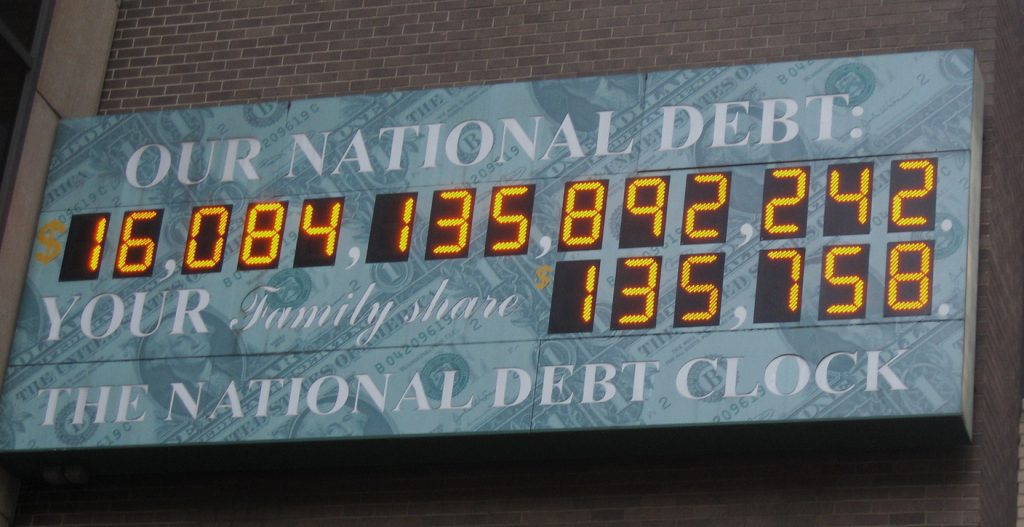According to reports, House budget chairman Paul Ryan has been urging his colleagues to back off on the budget fight and focus on a debt ceiling showdown. In exchange for an increase in the legal limit on federal government borrowing, Ryan believes the GOP can demand a series of items in return; starting with a delay of Obamacare, the construction of the Keystone pipeline and other spending reforms.
It’s still doubtful Republicans will be able to extract any meaningful concessions on Obamacare, but the president’s “I will not negotiate” over the debt ceiling position is undermined by the inconvenient fact that he already did in 2011. And, at the very least, depicting the conservative opposition as crazed nihilists becomes slightly more precarious for Democrats due to public opinion.
A new NBC/Wall Street Journal poll released last week finds that 44 percent of respondents are against raising the debt ceiling and only 22 percent believe it should be raised so the U.S. avoids “going into bankruptcy and defaulting on its obligations.” A third of those who answered are unsure.
A Reason-Rupe poll finds that 55 percent of Americans say they do not support raising the debt ceiling even if it causes the U.S. to default. With dollar-to-dollar spending cuts, 45 percent say they’d support raising it and 46 percent would still oppose.
ABC News has a poll out that finds voters nearly split on the debt ceiling, with 46 percent saying yes raise it and 43 percent saying no. Among Independents, 48 percent support raising it and 46 percent opposing.
When polls aren’t going your way it can only mean one thing: widespread ignorance.
Steve Benen at The Maddow Blog claims that “there’s nothing quite as useless as a debt-ceiling poll” because Americans “have no idea what the debt ceiling is, what default is, what bond markets are, or what the full faith and credit of the United States means, so polling on the subject tells us nothing.”
Certainly, there is some truth to the notion that Americans don’t bother with specifics – and that’s also, no doubt, true of the polling that Benen feels comfortable using to justify his political positions — but does it really mean nothing?
In this case, pollsters have gone out of their way to make sure those polled understand the consequences of their answer. Take a look at NBC poll’s question:
As you may know the federal debt ceiling acts as a check and limit on the country’s overall liabilities, including the federal deficit and other debts. When the U.S. Treasury needs to issue debt above the ceiling in order to avoid going into bankruptcy and defaulting on its obligations, Congress needs to vote to raise the ceiling. Congress is again currently considering whether and how much to extend the debt ceiling. Do you think Congress should or should not raise the debt ceiling? If you don’t know enough to have an opinion, please just say so.
The U.S. must pass it “to avoid going into bankruptcy and defaulting on its obligations” seems a fair way to characterize the outcome, even if some of us may quibble a bit. In the ABC poll, respondents even verify that they would be willing to risk hurting the economy in the short term for long term sanity on debt.
But let’s, for the sake of argument, concede that Benen is right. If pollsters only polled economic issues that everyone fully understood, they’d be out of work quick. As Barack Obama knows well, in politics it doesn’t matter if voters comprehend the intricacies of the bond market or default (or private equity and venture capital firms or creative destruction, for that matter) it only matters that they think they do.
Moreover, the supposed consequences aren’t as important as many in the media would have you think. When congressional liberals opposed additional funding for Iraq, no one was under the impression that troops were going to have to hitchhike home from Falluja. You may believe failing to hike the debt ceiling would be “calamitous” for everyone – as one GOP aide told the National Review – but no one seriously expects that it will happen. The only question is: what will be the parameters moving forward. That’s hardly an unprecedented political position or as destructive as the Left-wing punditry would have voters believe.
In general, voters like the the idea of embedded limits on government spending. So it’s no surprise that hiking debt limits perfunctorily, every single time we hit them (and without extraordinary measures we would have been there in May), isn’t an especially popular position. What’s so crazy about a dollar-for-dollar match in spending moving forward? What’s so crazy about delaying an expensive and unpopular program for a year? Do Dems believe in any limits on future debt? Whatever questions the GOP comes up with, they’ll be more productive than defending a shutdown. It’s still not ideal, of course. But it’s better than many of the alternatives.
Follow David on Twitter @davidharsanyi.



